|
Hotel Road
St. Margaret's at Bay
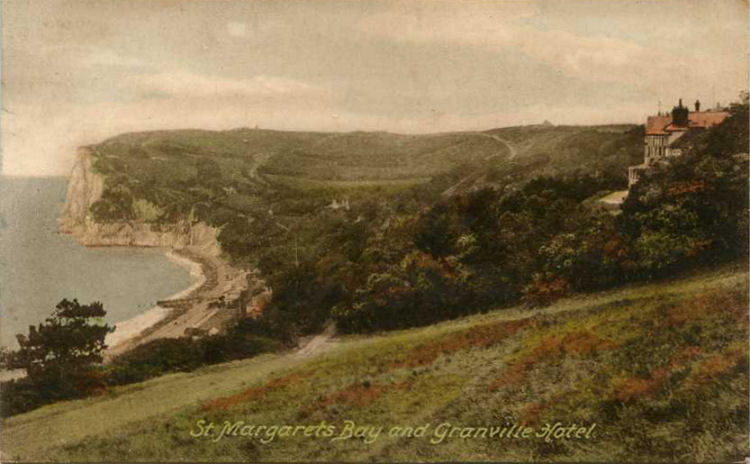 |
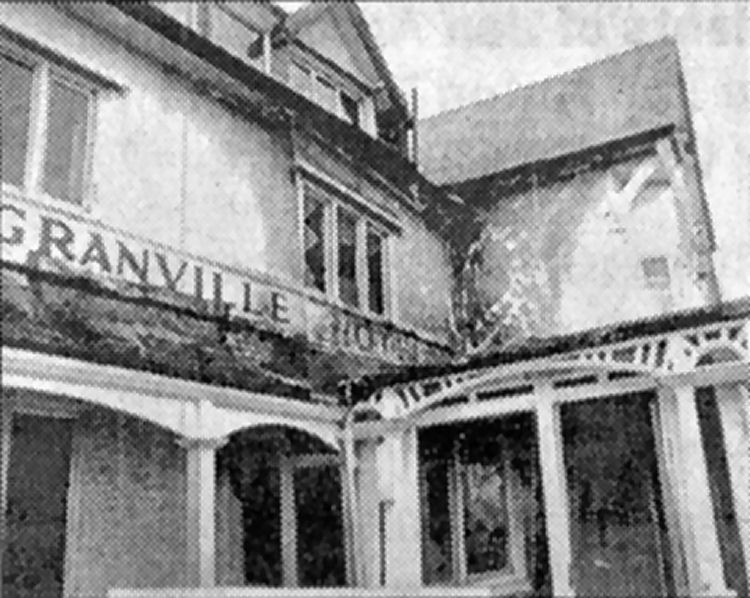
Above the Granville Hotel, date unknown.
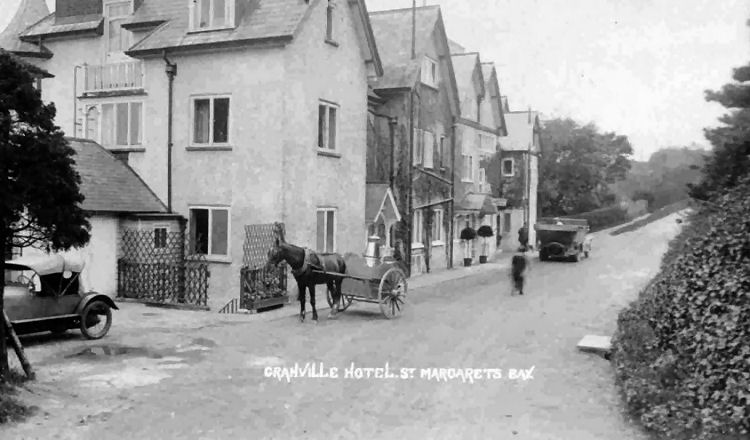
Above postcard, circa 1920s, kindly sent by Rory Kehoe. |
St Margaret's Bay joined the modern world in 1865 when Lord Granville, then the
new Warden of the Cinque Ports, decided the little fishing village should
blossom into a popular seaside resort. The Granville Hotel still stands as a
memorial to his lordship's dream and the resort that developed became home, at
different times, to such famous residents and visitors as Lord Arthur Cecil,
Lord Byron, Max Beerbohm, Noel Coward, Ian Fleming and Peter Ustinov.
In 1890, this establishment had a single digit telephone number of 4.
|
Whitstable Times and Herne Bay Herald 30 September 1882.
WINGHAM. PETTY SESSIONS. - DOVER SITTING. LICENSES.
It being the annual licensing day - all the licenses were granted
without opposition.
Mr. Stilwell applied for a full licence for the new hotel, built on Earl
Granville's estate, at St. Margaret's. It was explained that it was to
be used more for invalids than for ordinary hotel purposes.
The licence was granted without any hesitation after the evidence of Mr.
Hayward, agent for the property.
|
|
From the Dover Express and East Kent News, Friday, 27 July, 1888. Price 1d.
ST. MARGARET'S BAY REGATTA
This event has been arranged to take place on Wednesday next, under
distinguished patronage, and the programme is a capital one, containing
eight races of a varied and interesting character. The entries close
to-morrow. Mr. R. W. Philpott, the enterprising proprietor of the
“Granville Arms' Hotel,” and landlord of the “Royal Oak,” Dover, is the
Chairman and Hon. Treasurer. Mr. A. J. Philips is the Hon. Secretary,
and Mr. W. A. J. Bussey, deputy captain of the Dover Rowing Club, will
officiate as starter. There will be a band, out-door amusement, and a
display of fireworks in the evening.
|
|
From the Dover Express and East Kent News, Friday, 19 August, 1904. Price 1d.
TRANSFER OF THE GRANVILLE HOTEL
The license of the “Granville Arms,” St. Margaret's Bay, was transferred
from Mr. R. W. Philpott to Mr. J. Joyce, J.P. of Sandwich, the manager of
the East Kent Brewery Company, and landlord of the “Bell Hotel,”
Sandwich, and now residing at the “Granville Hotel.”
|
|
From the Dover Express and East Kent News, Friday, 16
Sept, 1904. Price 1d.
TRANSFER OF THE GRANVILLE HOTEL
The licence of the "Granville Arms" was transferred from R. W.
Philpott to J. B. Joyce. Mr. Joyce said that one of his manageresses
would run it, although he would reside there for some time in the
spring.
|
|
Dover Express 22nd September, 1916.
Dover Police Court.
Miss A. L. Carpenter of the "Granville" Hotel, St. Margaret's was summoned
for, on 23rd August at 9.40 p.m., contravening the Lighting Regulations,
the light being visible from the sea.
Mr. Byrne appeared for the defence.
Sgt. Beattie, R.G.A. said that on the 23rd August at 9.40 p.m. he
observed a bright light showing from a window on the second floor of the
"Granville" Hotel. It did not appear to be screened in any way. Witness
saw the light until 10.15 when he went to bed.
Bombardier Sherman said that he also saw the light. It continued to burn
brightly until 11.35 p.m. The light would have been visible miles out to
sea.
Sergeant Warner RDC said that he was on patrol duty at St. Margaret's and
the last witness called his attention to the light. As he got towards it
at 10.40 the light went out.
Police Sgt Hayden said that, on 27th August in consequence of the complaint, he visited the "Granville" Hotel and saw the defendant. He
pointed out the room from which the light was said to come and asked who
occupied the room. The defendant said it was occupied by a Mr. H. G. Ransom
and his wife. She said that he was a military officer and had left and
she did not know his address. The chambermaid said that the curtains
were drawn back when she went to the rooms the following morning.
Mr. Byrne said the defendant knew nothing about the light showing. It
was impossible for her to be in all the rooms. There were 37 guests
stopping at the hotel and she took all possible precautions. Every
window had a thick blind over the window and, in addition, curtains. When
the guests were at dinner, a maid pulled all the blinds down and drew
the curtains. At 9.45 p.m. the gas was turned off from all the bedrooms
and candles were given out. A notice was also placed in each room. In
reply to the Chairman, Mr. Byrne said that the hotel had a telephone and
could have been communicated with.
Miss Carpenter said that the rooms were occupied by a military officer.
The officer went back to the Front. Every evening a special constable
went round the house to see if there were any lights showing. She also
warned all the guests as to their lights.
William Pretyman said that he was a guest at the hotel on 23rd ult. and
he corroborated the evidence as to the precautions taken at the hotel.
No one but a wilful person could allow the light to be seen from the
sea.
The Bench inflicted a fine of 30s this being the third conviction. They
hoped that in future when there was a complaint from the Military
Authorities that they would telephone to the houses and warn them.
|
|
From the Dover Express and East Kent News, Friday 17
April, 1925. Price 1½d.
EXTENSIONS
The Management of the "Granville Hotel," St. Margaret's, were granted
an extension for a Masonic dinner on the 25th inst.
|
|
From the Dover Express and East Kent Intelligencer, 22 March, 1929. Price 1½d.
LICENSING
An extension was granted to the “Granville Hotel,” St. Margaret's, for a
Masonic dinner on April 20th.
|
|
From the Dover Express and East Kent News, Friday, 12 June, 1931. Price 1½d.
GRANVILLE HOTEL PROPRIETOR'S BANKRUPTCY
OFFICIAL RECEIVER'S EXAMINATION
The public examination of Geoffrey Francis Walter Spencer, of the
“Granville Hotel,” St. Margaret's Bay, was held at the Guildhall,
Canterbury, on Tuesday morning before the Registrar (Mr. F. M. Furley).
The liabilities were returned at £4,964 16s. 9d., and the assets at
£2,653 15s. 11d., leaving a deficiency of £2,311 0s. 10d.
Mr. J. Mowll appeared for the landlord, and Mr. Tong represented the
debtor.
Debtor was examined by the Official Receiver (Mr. C. J. Pyke). He said
that he was apprenticed as an engineer, but later served in the Royal
Flying Corps, in the ranks, and was then commissioned to the Royal Army
Service Corps. He was invalided out, and received a disability pension
of about £75 a year, and about 18 months later a lump sum final payment
of somewhere about £100. he left the Army in 1917 and took up business
as a consulting engineer and assessor of insurance claims. From 1919 to
1925 he was unemployed, but dealt in motor cars and shares casually. He
lost heavily, but could not put a figure on it. His mother was making
him an allowance of £500 a year, and that was his principle means of
living.
Official Receiver: I see that in 1922 you charge an expectant interest
in your mother's will for £8,000!
Yes.
And in 1924 your mother died?
Yes.
I see that in your banking account in March, 1925, there was a payment
in of £10,000!
Yes.
Debtor said that this was the proceeds of his interest in his mother's
will after paying off the charge.
So, altogether, in six years, 1919 to 1925, you received £8,000 and £500
a year, making £3,000, a total of £11,000, and in March, 1925, your bank
balance was only £400, so that in six years you got through £10,000!
Yes.
That is at the rate of something like £1,900 a year. How did you spend
it?
Well, I was living to start with.
You must have known that there would come a time when there would come
an end?
Presumably, at the time I did not realise it.
Debtor, further examined, said that during this time he was in a betting
business known as Harry Smith. He put up the capital and they shared
fifty-fifty, but they did not share any losses.
The Registrar: A very nice kind of partnership.
Debtor said he left off going to the office and let Smith have the
wreck. He occasionally attended race meetings, but he did not bet
extensively, and it would not account for a substantial part of the
£10,600. he was living at Gloucester Row at the time, having three
floors above a shop and paying £150 a year.
The Official Receiver: That does not sound very expensive, and the
inference is that you were personally extravagant!
Probably so. Yes.
You received something like £20,000 under your mother's will, and had
you invested that you would have had £1,000 a year to live on!
Yes.
You knew you were living on capital and now you come before the Court
with a deficiency of £2,000!
Yes.
Debtor admitted when he went into the hotel at St. Margaret's bay in
September, 1928, had had only shares of the approximate value of £4,000
and an overdraft of £1,000.
So between 1925 and 1928 you had gone through over £7,000!
Yes.
I take it the reason was the same – personal extravagance!
Well, call it that.
Don't call it that, answer the question properly and if you don't agree,
say so.
I was educating my children and keeping my wife.
The Registrar: These things will be brought up against you if you apply
for your discharge, and you want to be careful. You don't want to answer
quite so casually.
I am not trying to be casual.
Debtor was questioned as to the St. Margaret's hotel business. He said
that the first year's takings showed a loss of £1,120, but he did nit
agree he was insolvent then as there was the business there and the bank
held the securities. He had no experience previously of running an
hotel. He put in new staff, which fluctuated in numbers according to the
amount of business. He saw accounts of sorts before taking over the
hotel, but had no expert advice.
The Official Receive pointed out that the net trading profit on the
first year was only £430. Did he notice he was drawing from the business
at a rate of £13 a week.
The Official Receiver: That is not the sort of thing you would notice,
but you realise now that it was a fact!
Quite likely.
Where did you suppose it was coming from when you had no further capital
to draw upon?
I am afraid I did not suppose.
You are a man of some intelligence and you must have realised it must be
out of the pockets of your creditors!
I am afraid it did not appear to me in that light at that date.
The Official Receiver said that the accounts showed that the debtor was
making 55 per cent. gross profit on his turnover, but this was reduced
by trading expenses to less than 10 per cent. Overhead charges and
trading expenses absorbed 46 per cent. of the gross takings. He knew
that a considerable amount of bank interest was being paid.
Debtor, questioned about this, said that there were 30 bedrooms. The
replacements in that year cost £215 as there was not enough linen for
all the beds. The following year it was £90. Wages accounted for £803,
and that did not include anything for himself. Bank interest accounted
for £284, and rent £375. Advertisements were heavy, £169, which included
the publication of a brochure.
The Official Receiver: This wasn't really a normal year's trading, and
you were preparing the ground for later!
Yes, I was hoping.
The Official Receiver: from September, 1929, to the date of the
receiving order your trading expenses were £2,408 for the period of
about 18 months, so you reduced your overhead charges, but that includes
a bad summer!
Yes, two winters and a bad summer.
Debtor said that he opened an account at Lloyds in Dover in September,
1929, not because Barclays in Pall Mall were getting restive but to have
a social account. He paid Messrs. Hawks, tailors, in Saville Row, £51
ten days before receiving order. He had had a writ from them, but had
not been served with the bank writ. He attributed his failure to
commencing on borrowed capital, depreciation in the value of securities
and the bad summer season of last year. The shares, when deposited, were
valued by the Bank at £1,000, and were now put at £1,000. Since he filed
his petition he had had a notice that one company were defunct; the
shares he bought at 10s., 1,000 of them.
Mr. Tong said that wiser men than debtor had lost money in investments
recently.
The Registrar said that was true, but did that justify him drawing so
high? That was very much against him.
Mr. Tong: It is not all your own personal expenses?
No.
Had your wife power to draw in your account?
Yes.
The examination was closed.
|
|
From the Dover Express and East Kent News, Friday, 16 June, 1933. Price 1½d.
ST. MARGARET'S BANKRUPTCY
Geoffrey Francis William Spencer, formerly of the “Granville Hotel,” St.
Margaret's Bay, applied to his Honour Judge Clements at a sitting of the
Canterbury Bankruptcy Court on Tuesday, for his discharge.
The Official Receiver (Mr. F. H. Langmaid) said the receiving order was
made on April 24th, 1931, and liabilities were estimated at £4,964 16s.
9d., but proofs actually admitted amounted to £7,451 10s. 10d. The
assets were estimated to produce £2,653 15s. 11d, but the trustees
realised £1,582 13s. 7d., with about £150 still to come. A dividend of
2s. 3d. in the £ was paid on £7,432, and a further small supplemental
dividend of about 3s. might be paid.
Debtor said that before he was advised to file his petition he was in
negotiation for the sale of the hotel.
His Honour said that part of the failure was due to misfortune. He
granted the discharge subject to a suspension for six months.
|
|
From the Dover Express and East Kent News, 22 November, 1935. Price 1½d.
HUNT BALL LICENCE
The licence of the "Granville Hotel," St. Margaret's was granted an
extension from 10 p.m. to midnight on December 24th, for a dance.
|
|
From the Dover Express and East Kent News, Friday, 8
March, 1946.
The licence of the "Granville Hotel," St. Margarets, was renewed, it
being stated that it was hoped to reopen the premises on 1st April.
|
|
From the Dover Express and East Kent News, 11 April 1952.
Stole from St. Margaret's Hotel.
Committed for sentence by the Wingham and Sandwich magistrates after
he had pleaded guilty to stealing £7 9s. from the Granville Hotel, St.
Margaret's. Anthony M. Lyons (19), of Speke, Liverpool, appeared before
the East Kent Appeals Committee at Canterbury on Thursday, represented by
Mr. W. A. B. Forbes.
Mr. David Wacher, prosecuting, said that Lyons entered the hotel on
March 1st, ordered tea an was served my Mrs. Bliss, the barmaid. She then
went to the kitchen, leaving Lyons alone. When she returned, he had gone
- and so had £7/9/- from the till.
The Police picked up Lyons' trail after he had travelled by taxi to
Dover. He was caught at Ashford railway station.
Det-Cons. J. Moxon said Lyons had seven previous findings of guilt.
When on holiday in Deal in 1956, he met a local girl with whom he became
friendly and later he came back and lodged at her home in Walmer.
The chairman (Mr. Tristram Beresford, Q.C.) referring to Lyons'
record, said he had had every possible chance and would now go for
Borstal training.
|
|
From the Dover Express 11 September 1970.
Hotelier's death.
Mr. Cyril Graham Horspool, owner of the "Granville Hotel" at St.
Margaret's Bay died at a Hythe nursing home on Friday. He moved to St.
Margaret's Bay six years ago.
From the Dover Express 18 September 1970.
Hotelier helped found institute.
Hotelier Mr. Cyril Graem Horspool at St. Margaret's Bay - whose death
was reported in last week's paper - was a founder fellow of the Hotel and
Catering Institute.
After working in North Wales for many years, Mr. Horspool left to
become the General Manager of the "Hotel Imperial," Hythe.
In 1958 he retired to the "Granville Hotel," St. Margaret's Bay, six
years ago he moved to Ravenscroft, St. Margaret's Bay.
Mr. Horspool is survived by his wife Susan and daughter and son.
|
|
From the Dover Express 20 October 1994.
Hotel auction will be the sale of the century.
THE entire contents of now-closed Granville Hotel at St. Margaret's Bay
go under the auctioneer's hammer on Saturday, October 29.
Items that used to interest Noel Coward and his weekend guests, Ian
FIeming and his friends. Peter Ustinov and his family - all of whom once
lived, in the Bay - will go to the highest
bidder.
The Granville Hotel, built by the Earl of Granville in 1881-82, will
then be empty, ready for the developers to demolish the well known
property and build 31
apartments in its place.
Owner Robert Warner obtained pIanning
permission to do this four years ago after a long battle with villagers
and conservationists who wanted to retain the hotel. But Mr Warner
argued it no longer paid. He closed the hotel earlier this
month.
In the days soon after Earl Granville, then Lord Warden of the Cinque
Ports, had the hotel built, the Bay was the weekend home of
millionaires. The Granville Hotel became popular with honeymoon couples
- and an attractive place for wealthy London gentlemen
to bring their mistresses.
The restaurant table overlooking the sea, from where diners could see
the Goodwin Sands, once commanded a premium on the bill.
Soon the glory
days of the GranvilIe
Hotel will be just a memory.
Now the dealers are moving in to see what is to be auctioned. There's
plenty, from huge mirrors to ash trays.
Allen Mitson, business
consultant of St. Margaret's Bay acting for Mr Warner, says there's
particular interest in the binnacle, made in Madrid, that once held the
compass on a Spanish galleon and the World War II U-boat commander's
binoculars still fixed into the original U-boat
stand.
Viewing of what's on offer is on Friday, October 28 and all the items
are to be sold without reserve on the following day with the auction
beginning at 10am.
|
|
Going for a Song
From the East Kent Mercury 3 November 1994
|
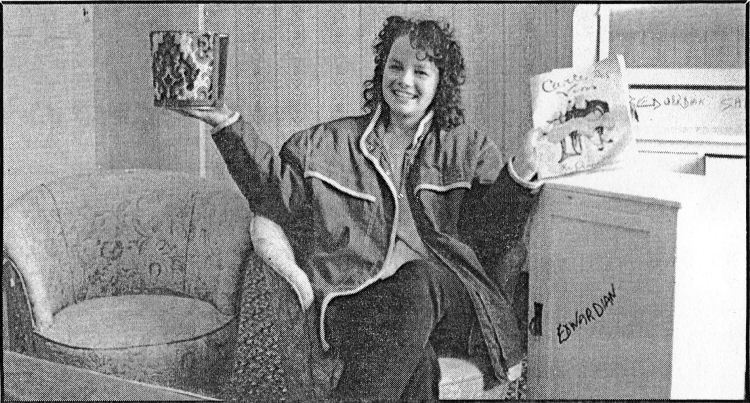
East Kent Mercury reporter Amanda McDine with the
bedroom she bought for £80 at the Granville Hotel auction at St
Margaret's
Photo by Mike Waterman |
|
Article by Amanda McDine.
WITH heart pounding and adrenalin pumping I held up my bidding card as
nonchalantly as possible. "Yes, £80. That's right," I squeaked.
I was bidding for the entire contents of a bedroom in Saturday's auction
at the Granville Hotel (writes Amanda McDine).
The hotel, although damp,
peeling and faintly musty, has a genteel charm and the auction had
attracted bidders in their hundreds. I was astounded when the first
bedroom under the hammer had been sold for just £20. So when the next
one came up I knew I had to have it at all costs - well, £80, anyway.
Bidding at an auction is much better than doing drugs. The high is unmistakable, there is no danger of overdosing and no hangover afterwards.
I bought the room. Unfortunately I was not familiar with my new
acquisition as although I had wandered around the hotel the day before I
had lost track of the warren of bedrooms I had seen.
Dashing upstairs I found my room. A double bed, a satin walnut dressing
table and pine bedside cabinet both hiding under several coats of white
paint. A mirror, a carpet, curtains, a bin, two tub chairs in need of
reupholstering and a fantastic view. Definitely £80 well spent, I
thought.
Wandering downstairs again I listened to some of the bidding going on.
Everything seemed to be going at knock
down prices and it was as much as I could do not to keep putting my hand
in the air like a demented schoolchild.
But I had to have another fix
and managed to buy a second room for £50. This one had a pine wardrobe,
pine dressing table and bedside table, a badly stained bed, a lamp and
another bin. Another bargain.
I was on a high all day even though my
house now looks like a second-hand furniture shop. But at the same time
it was sad to see this famous hotel, once the haunt of Noel Coward and
Ian Fleming, being dismantled piece by piece by scavengers like me.
All
the same, it would have been nice to have been able to take home the
view.
|
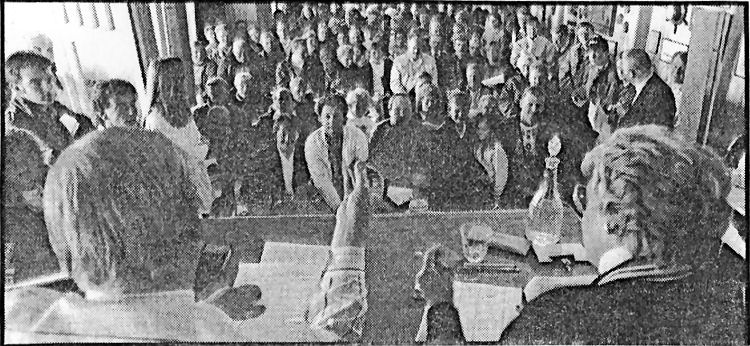 |
|
Article by Graham Tutthill
THE old hotel had not seen so many people for years.
Some had travelled
long distances to take their pickings before demolition men moved in.
The Granville Hotel, at St Margaret's, had welcomed many notable guests
in its heyday, Noel Coward and James Bond author Ian Fleming among them.
They had stayed in its bedrooms, eaten in its dining room, sipped at its
bar and relaxed on its balcony.
But the opulence had long since gone,
planning permission has been given for flats to be built on the site and
all that remained to be done was to auction off the hotel contents.
Among some of the more interesting items were those not for sale.
Crusts, cut from
the bread before it went into the toaster, were still in a box on the
floor of the kitchen.
There were bottles of Noel's ground nutmeg, white
pepper and garlic powder in a basement storeroom.
Magazines had been
left on the stools and chairs in the bedrooms and bathrooms as if guests
had only just finished reading them and washing was still hanging on a
line next to the ironing board.
Empty bottles of Elgin whisky and South
African sherry bore the labels of John Lukey and Son, of Dover,
Folkestone, Walmer and Hythe.
There was a 1973 calendar
on a mantelpiece, and who knows what it was that a member of the hotel
staff had been counting so meticulously with rows and columns of pencil
marks on the wall?
And no-one, of course, could buy the magnificent
view.
The elegant dining room was packed, with many bidders standing
outside, by the time lot one, a framed map of Kent, came under the
hammer and went for just £6.
A working wrought iron electric clock was
bought for £4, as was a typist's swivel chair. Two stools went for £3
each and a notice-board complete with lettering was knocked down for £22.
A large mirror that many guests had gazed in as they passed the bottom
of the
staircase was sold for £22, an old foot stool went for £60, and the
ladies and gents loo signs were bought for £45.
Among some of the more nostalgic items were an old copper post-horn
(£75), a ship's brass bell which used to hang in the bar (£45), a plate
ice bucket from the bar (£40), a cast-Iron wood burning stove (£170),
and a framed photograph showing cross-Channel trenching in 1983/84 with
all the engineers' signatures, which went for only £5.
A binnacle compass from a Spanish galleon, made in Madrid, fetched
£600.
Whole bedrooms, complete with beds, carpets, Edwardian cabinets,
dressing tables, mirrors and wardrobes, were sold for anything
from £20 to £110.
But all eyes were on lot 185, the Second World War U-boat binoculars on
their original stand. With "fantastic magnification", they were said to
have been used by Fleming to see the time on the clock of Calais Town
Hall!
Auctioneer Alien Mitson eventually brought the hammer down at £2,200,
the winning bid coming from a mystery buyer on the telephone.
More than 550 lots were sold, including houseplants, pillows, fire
extinguishers, wooden trays, wine glasses and the hotel safe - empty,
of course!
|
|
From the East Kent Mercury 23 June, 2011.
GLAMOUR OF GRANVILLE IS REMEMBERED
THE "Granville Hotel" at St Margaret's, overlooking the sea towards
France, was once one of the most popular places to stay in the years
between the two world wars.
It is believed that in its heyday its guests included
Ian Fleming, Noel
Coward, Audrey Hepburn and Princess Margaret.
It was demolished in the 1990s and Granville Flats was built on the
site. One of the occupiers is Audrey Kirk, who has organised an outdoor
exhibition about the hotel for the Garden Safari at St Margaret's next
week.
She said the business opened in 1890 and was enlarged after the First
World War, when it enjoyed its heyday for visitors.
In the Second World War it was taken over by the Army, but
re-established as a hotel after 1945.
Audrey added: "It began to decline and didn't have its old charisma. But
people do remember going there for Sunday lunch and afterwards going out
on the balcony for the fantastic view.
"There was a pair of binoculars
and on a clear day it was possible to read the time on the clock tower
at Calais."
The hotel business eventually closed, the site was auctioned, but after
a fire it was knocked down,
despite strong opposition. It was demolished in the early 1990s and
Audrey moved into the new flats 12 years ago, enjoying the beautiful sea
views but not the state of the grounds.
She is now in charge of a team of garden volunteers who have been
restoring the lawns and flowerbeds.
Audrey added: "It is a very big garden and the two-day Safari will be
the first time it has been opened to the public."
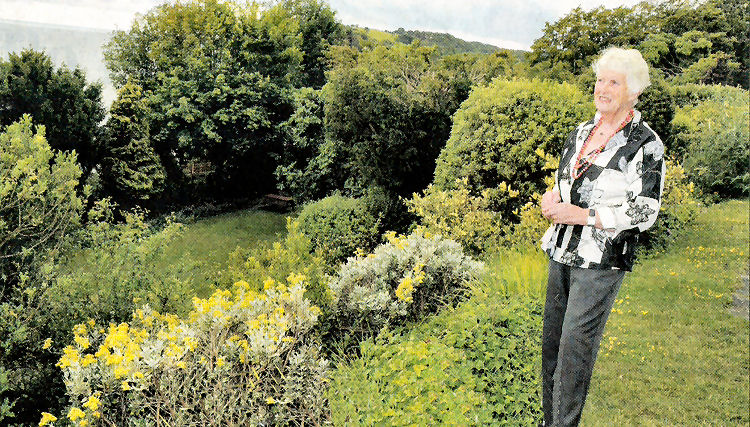
Above shows Audrey Kirk in the restored gardens of the "Granville
Hotel."
|
|
From the Dover Mercury, 1 September, 2011.
70p
VILLAGERS OBJECT TO PLANS TO DEMOLISH GRANVILLE HOUSE
VILLAGERS at St Margaret's are calling for a stop to plans to
demolish a cliff-top house in the conservation area to make way for a
large and dominant new home.
The 100-year-old property called Granville House is one of the
earliest built as part of the narrow strip of development in Granville
Road.
An objection has already been lodged by the National Trust, unhappy
with the amount of glazing in the structure, and people at St Margaret's
have written protest letters to the district council hoping the planning
committee will stop the development.
At Thursday's committee meeting the council leader Cllr Paul Watkins
made a plea to councillors to visit the site before deciding whether or
not to approve the plans.
He said: "We don't want another example of the former "Granville
Hotel," which went round and round for years and years.
"But Granville House Is being neglected and it is an eyesore. It
needs to be dealt with."
Cllr Bernard Butcher said the house had been well designed but had
been left to go to ruin, which should not have been allowed.
Committee chairman Cllr Frederick Scales said that a site meeting
could give councillors the opportunity to take into account the visual
impact of the proposals.
Councillors agreed to postpone any decision until they have visited
Granville House.
At the same tune they will also look at another house in Granville
Road, on the junction with Victoria Avenue, where developers also want
to demolish the property and build a new home.
The plot is on the edge of the conservation area and planning chief
Mike Dawson said the house was not regarded as a historic heritage
asset.
Rachel Humber case-officer, said that the replacement home was "a
unique building in a unique location and there was much to commend its
design."
|
|
From the Dover Express, 29 December, 2011. 60p.
DEMOLITION BID
ST MARGARET'S: Parish councillors at St Margaret's
and district councillors at Whitfield are to be asked in the new year to
agree to the demolition of Granville House at 35 Granville Road, St
Margaret's Bay.
Mike Chidzey, of Priorylands, Bracknell, proposes to knock down the
four-bedroom house so another modern residential four-bedroom property
can be built on the site.
Mr. Chidzey says Granville House is 'redundant' and, as far as he
understands, has been unoccupied since about 1997.
|
LICENSEE LIST
SMITH Charles to Oct/1884 
PHILPOTT Richard William Oct/1884-Sep/1904
          (also of the "Royal Oak, Dover)
(also of the "Royal Oak, Dover)
COLLARD Agnes (manageress) 1890+ (age 30 in 1891 ) )
 JOYCE Mr J B Sep/1904+
JOYCE Mr J B Sep/1904+

CARPENTER Miss A L (Manageress) 1914-18+
 
TULLY C 1923-24+  
SPENCER Geoffrey Francis Walter to May/1931

NEYLAN Patrick Senan Thomas May/1931-Apr/32
 (Official
trustee) (Official
trustee)
LEVERS George Julian Apr/1932-39+ (age 56 in 1939)
  (Retired banker of Brighton)
(Retired banker of Brighton)
St Margaret's Bay Ltd 1938+

HORSEPOOL C G 1961+
WEINREB Adam & SWEENEY D 1974+

 STRYCZEK Joseph after 1975+
STRYCZEK Joseph after 1975+
https://pubwiki.co.uk/GranvilleHotel.shtml
 From Pikes Dover Blue Book 1889 From Pikes Dover Blue Book 1889
 From Pikes Dover Blue Book 1890 From Pikes Dover Blue Book 1890
 From Pikes Dover Blue Book 1891 From Pikes Dover Blue Book 1891
 From Pikes Dover Blue Book 1895 From Pikes Dover Blue Book 1895
 From Pikes Dover Blue Book 1896-97 From Pikes Dover Blue Book 1896-97
 From Pikes Dover Blue Book 1898 From Pikes Dover Blue Book 1898
 From Pikes Dover Blue Book 1899 From Pikes Dover Blue Book 1899
 From Pikes Dover Blue Book 1899-1900 From Pikes Dover Blue Book 1899-1900
 From the Post Office Directory 1901 From the Post Office Directory 1901
 From the Post Office Directory 1914 From the Post Office Directory 1914
 From the Post Office Directory 1918 From the Post Office Directory 1918
 From Pikes Dover Blue Book 1923 From Pikes Dover Blue Book 1923
 From Pikes Dover Blue Book 1924 From Pikes Dover Blue Book 1924
 From Pikes Dover Blue Book 1932-33 From Pikes Dover Blue Book 1932-33
 From Pikes Dover Blue Book 1938-39 From Pikes Dover Blue Book 1938-39
 Library archives 1974 Library archives 1974
 From the Dover Express From the Dover Express
|





